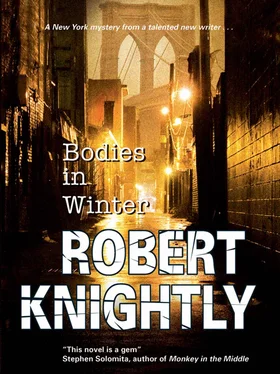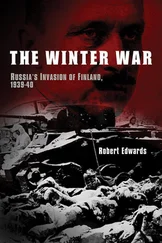Robert Knightly - Bodies in Winter
Здесь есть возможность читать онлайн «Robert Knightly - Bodies in Winter» весь текст электронной книги совершенно бесплатно (целиком полную версию без сокращений). В некоторых случаях можно слушать аудио, скачать через торрент в формате fb2 и присутствует краткое содержание. Жанр: Полицейский детектив, на английском языке. Описание произведения, (предисловие) а так же отзывы посетителей доступны на портале библиотеки ЛибКат.
- Название:Bodies in Winter
- Автор:
- Жанр:
- Год:неизвестен
- ISBN:нет данных
- Рейтинг книги:4 / 5. Голосов: 1
-
Избранное:Добавить в избранное
- Отзывы:
-
Ваша оценка:
- 80
- 1
- 2
- 3
- 4
- 5
Bodies in Winter: краткое содержание, описание и аннотация
Предлагаем к чтению аннотацию, описание, краткое содержание или предисловие (зависит от того, что написал сам автор книги «Bodies in Winter»). Если вы не нашли необходимую информацию о книге — напишите в комментариях, мы постараемся отыскать её.
Bodies in Winter — читать онлайн бесплатно полную книгу (весь текст) целиком
Ниже представлен текст книги, разбитый по страницам. Система сохранения места последней прочитанной страницы, позволяет с удобством читать онлайн бесплатно книгу «Bodies in Winter», без необходимости каждый раз заново искать на чём Вы остановились. Поставьте закладку, и сможете в любой момент перейти на страницу, на которой закончили чтение.
Интервал:
Закладка:
‘If that’s the plan, no one’s told me about it.’
I looked over his shoulder and saw Adele seated at her desk thirty feet away. She was staring directly at me, her gaze sharp and contemptuous. She’d been awaiting my return for hours and now I was bullshitting with my buddy. How predictable.
‘My partner’s giving me the evil eye.’
Jack’s smile dropped away and his expression became grave as he tossed me a snappy salute. ‘Time to report, soldier.’
Like many of my peers, Jack professed not to know why I continued to partner with Adele Bentibi when I had more than enough seniority to demand a change. He knew that I’d once been on the verge of marching into Sarney’s office to do just that, even though it was clear that Adele was my perfect complement. Her strengths were crime scenes and physical evidence, while mine were interviews and interrogations. But partnering is about more than solving crimes and there’s no hell quite like spending all of your working hours with someone whose company you’d rather avoid, even if you’re physically attracted to her.
Simply put, like everybody else, I found Adele insufferably opinionated, and the fact that her judgments were usually right meant next to nothing. Plus, I’d only agreed to work with her as a favor to Bill Sarney. Adele had come to the 116th Precinct with a reputation. ‘Difficult to get along with,’ that was how Sarney explained it, a little character flaw that I should overlook, at least temporarily.
I don’t remember my attitude on the day I agreed to work with Adele. Perhaps I was resentful, the fair-haired boy imposed upon. Or maybe I took the assignment with good grace — I was definitely out to please at the time. But after three months, I was certain that I’d had enough. Adele was very abrupt, seeming to dismiss my opinions before I managed to state them. More to the point, she was blind to a number of deficiencies related to her poor communication skills. I could not convince her that an interview is not an assault, an interrogation not a cavalry charge.
Eight hours a day? Day after day? I didn’t think so.
‘Martha Stewart with a badge’ was the way Nydia Santiago had described my partner, and I could see where Nydia was coming from. But she’d gotten it wrong. I found this out when Adele told me her story over dinner.
I remember that it was the perfect night for a confidence. Adele and I had spent the prior ten hours in pursuit of a rapist named Joey Garglia, running from friend to relative to friend, sometimes threatening, sometimes cajoling. Finally, at six-thirty, Joey’s mother had called. Her son was sitting in her living room and he was ready to surrender.
By any standard, it’d been a very good day, a day of hard work and real accomplishment which we were capping with a decent Italian meal and a couple of drinks. Though I wasn’t expecting much, the alcohol made me bold enough to ask an impertinent question.
‘So, tell me, Adele, what’s your story? How’d you become a cop?’
My partner never did answer the second question, not directly, but her response to the first part was enough to change the way I understood her. Permanently.
Adele could trace her family of Sephardic Jews back to the twelfth century when they lived in an area of northwestern Africa called the Maghreb. For centuries, she explained, their lives were reasonably stable, as were their relations with their Christian neighbors and Muslim rulers. Then the Almohad Dynasty had emerged at the head of a puritanical movement that tore the region apart. The aim was to purify Islam, a deed accomplished by the forced conversion of Christians and Jews; by the sale of Christians and Jews into slavery; by the slaughter of whole villages. Adele’s family had fled, ironically enough, to Spain, from which they were expelled by Queen Isabella in 1492, the year Columbus sailed his little fleet in search of India.
I was munching on a crispy slice of bruschetta, and well into my second drink, when I finally realized that Adele wasn’t talking about a succession of parents and grandparents stretching back nine hundred years. Her ancestral legends were tribal. Still, I was completely absorbed. My concept of family was so far removed from Adele’s that we might have been different species.
From Spain, the ‘family’ went to Istanbul, on the shores of the Black Sea, then to Baku, on the Caspian, then to Baghdad, Tunis, Cairo and back to Istanbul. Restless as gypsies, they were always on the move, always calculating the dangers around them.
They were in Damascus in 1840 when things again came to a head. A Capuchin monk and his servant disappeared. A Jewish barber was tortured until he admitted the men were murdered because their blood was needed for Jewish rituals. More Jews were then arrested and tortured until the Ottomans, at the request of the British and French governments, ordered the surviving Jewish prisoners released.
But the Damascus Affair was only the first of many similar persecutions that finally drove the Bentibis (by then, Adele was speaking of her actual family) out of the Islamic world. They’d gone to Belgium first, in 1948, then come to New York, settling along the southern end of Main Street in the Queens neighborhood of Flushing. Adele was the youngest child of the youngest child to make that journey.
We were outside by the time I realized that Adele had answered my second question in her own way. Her voice hadn’t betrayed a hint of self-pity when she told her tale. Nevertheless, I now understood that, for Adele Bentibi, the job was about justice.
And I understood something else, as well. I’d spoken to a number of cops, including Jack Petro, about my intention to seek another partner and it had almost certainly gotten back to Adele. In the family-like atmosphere of a New York City precinct house, secrets are rarely kept for any length of time. So, why had Adele, ordinarily so closed, suddenly confided in me? What message was she sending? I played with both questions before I decided that revealing herself was Adele’s way of asking me to continue the partnership. Partners, after all, tell each other everything.
It was hot on the street, especially in contrast to the heavily air-conditioned restaurant, and foggy as well. As I stood out on the sidewalk with my hands in my pockets, the fog settled around my face and throat, hot and slick, like the breath of an animal. Adele was standing in front of me, her face turned up, her dark and slanted eyes for once soft and vulnerable. I stared down into those eyes for a long moment, the urge to take her into my arms, to taste her mouth, nearly overwhelming. And I was almost certain she’d respond, that I wouldn’t be rejected. Adele was leaning forward, her weight on the balls of her feet, as if about to sprint, and she continued to stare into my eyes until I finally chickened out.
‘Goodnight, partner,’ I said, making a feeble attempt to keep my tone casual. ‘I’ll see you in the morning.’
‘Corbin,’ Adele said as I approached her desk, ‘look at these. Tell me if you see what I see.’
I watched Adele lay eight crime scene photos, in two rows of four, on my desk.
‘Am I allowed to hang up my coat first?’
‘Of course.’
The detective squad at the One-Sixteen covered most of the second floor of a three-story brick building on Catalpa Avenue. The layout was simple enough: a large room broken by the lieutenant’s office, a door leading to a corridor, a corridor leading past three interview rooms. There were ten desks in the main room, set back-to-back. They were all in use when the squad was fully staffed, but times were tough and the NYPD, once 42,000 cops strong, was down to 35,000 and still shrinking. Our own little squad had been making do with eight detectives for almost a year.
Читать дальшеИнтервал:
Закладка:
Похожие книги на «Bodies in Winter»
Представляем Вашему вниманию похожие книги на «Bodies in Winter» списком для выбора. Мы отобрали схожую по названию и смыслу литературу в надежде предоставить читателям больше вариантов отыскать новые, интересные, ещё непрочитанные произведения.
Обсуждение, отзывы о книге «Bodies in Winter» и просто собственные мнения читателей. Оставьте ваши комментарии, напишите, что Вы думаете о произведении, его смысле или главных героях. Укажите что конкретно понравилось, а что нет, и почему Вы так считаете.












